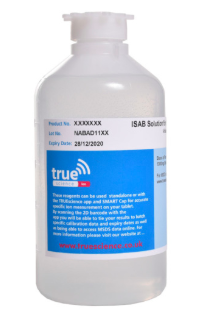What is an ionic strength adjustment buffer (ISAB)?
16 September 2019
16 September 2019
Ionic strength adjustment buffers are required to make accurate ion measurements using ion selective electrodes (ISEs). ISEs can be used to test a wide range of ions and for many applications such as potassium in soil or chloride in water.
When you have a solution with a large number of ions the individual ions move less freely and with have an increased number of interactions with each other. As the ion concentration increases, it decreases the chance that the specific ion you are measuring will come into contact with the ion sensing electrode. This can mean that even if there is a large amount of the ion in your sample, if your sample is highly concentrated with ions, your electrode won’t be read as a high concentration, as if your solution has a low overall ion concentration.
ISABs are used to counteract this issue. They are made from a high ionic strength solution, and is added in equal amounts (normally 2ml to every 50ml) to all the of the standards and samples. Once the ISAB is added it equalises the ionic strength for the standards you care calibrating your meter with and the standards you are measuring.

These extra stages required for ion selective measurement does mean that it’s not as straight forward as a pH electrochemistry reading, but is vital for accurate measurement. For help making your own Ion measurements please get in touch with our technical team or give us a ring on +441954233114. Alternatively leave a comment down below and we’ll get back to you as soon as possible.